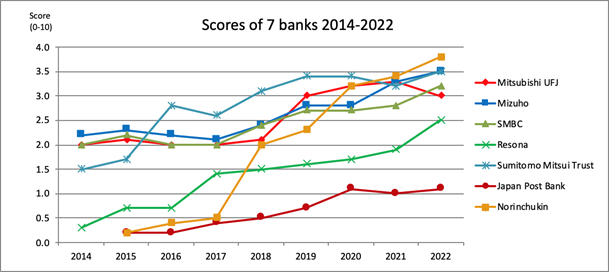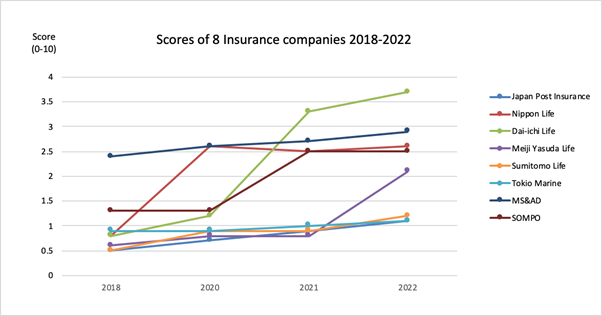
Moka Yamagata of Fair Finance Guide Japan discusses the new assessment scores and shows the clear success of the “race to the top” approach of the Fair Finance Guide in Japan with greater engagement with Japanese financial institutions and scores continuing an upward trend since the assessments started.
The latest set of scores was released in December 2021 by Fair Finance Guide Japan, a coalition of Japanese NGOs that shed light on investment and lending policies of major banking groups and insurance companies. Norinchukin Bank and Dai-ichi Life, which ranked top in the previous assessment last year, maintained the lead by further strengthening their policies. Most of the assessed financial institutions improved on their climate change policies, but still lag far behind their European counterparts. The European banks score at an average of 6.4 points while those of Japan score at 2.9 points.
Norinchukin Bank improved their score by strengthening their policies, including a new policy for the arms industry, which states that the Bank will not provide direct financing or investment for the manufacturing of nuclear weapons, biological and chemical weapons, or anti-personnel mines. Dai-ichi Life has a lead over other insurance companies and banking groups, especially on the themes such as labor rights, human rights and diversity by setting these themes as agenda items for engagement with their investees.
In addition, Resona Bank notably improved their score by strengthening their lending policy, which states that the Bank will not finance projects that exert a negative impact on wetland sites designated by the Ramsar Convention or on the World Heritage Sites designated by UNESCO, or projects that violate the Convention on International Trade in Endangered Species of Wild Fauna and Flora (CITES). Meiji Yasuda Life, which ranked at the bottom in the previous year, increased their score by clarifying that they expect investees to comply with the UN Global Compact. On the other hand, Japan Post Bank, Japan Post Insurance and Tokio Marine ranked at the bottom this year.
The movement by financial institutions to shift financial flows towards the achievement of the goals of the Paris Agreement has been accelerating. Since the previous assessment, Mitsubishi UFJ, Mizuho, SMBC, Sumitomo Mitsui Trust, Dai-ichi Life, Nippon Life, Meiji Yasuda Life, Sumitomo Life, MS&AD and SOMPO made a commitment to aligning their lending and investment portfolios with net zero greenhouse gas (GHG) emissions by 2050. Also, all assessed financial institutions except for Norinchukin Bank, Japan Post Bank and Japan Post Insurance disclosed GHG emissions from their lending and investment portfolio – the efforts have been made to enhance climate-related financial disclosure in line with the TCFD recommendations.
Race to the top among the Japanese financial institutions
The Fair Finance Guide Japan started in 2014. This is the 9th assessment for Japanese banking groups and the 4th assessment for insurance companies.
The race to the top approach of the Fair Finance Guide has worked well for the Japanese financial institutions. The scores continue an upward trend since we started the assessment, and through engagement with them, we have seen the increased willingness of the financial institutions to improve their ESG policy and do better than their competitors.




Our engagement with the financial institutions has been one of the keys to drive them to strengthen and disclose their ESG policies and efforts. Norinchukin Bank, for example, is the one that we have had the most active engagements since the first year of the assessment for the Bank, when they only received an average score of 0.2 and ranked at the bottom of all Japanese financial institutions assessed. Taking into account our engagement and suggestions, the Bank has remarkably improved their scores by applying international standards to their investment and lending policies, as well as by developing new sector policies. The Bank now ranks at the top two years in a row.
Having said that, there is much room for improvement for all the Japanese financial institutions. In the next assessment, we look for raising the level of ESG policies of all the financial institutions. Also we expect to see changes in the ranking, replacing the top-ranking financial institutions, and that leads to a higher level of competition among them.
————————————————————————————————————————————————
A blog by Moka Yamagata, Japan Center for a Sustainable Environment and Society (JACSES), Fair Finance Guide Japan.
Fair Finance Guide Japan is run by a network of non-profit organizations based in Japan: Alternative Peoples Linkage in Asia (APLA), Japan Center for a Sustainable Environment and Society (JACSES), Japan Tropical Forest Action Network (JATAN) and Pacific Asia Resource Center (PARC). This is a joint press release by these four organizations.